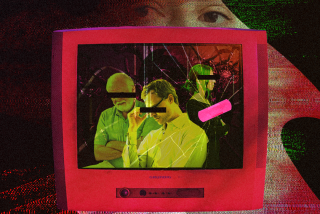Community Essay : ‘Language Keeps Racism Alive’ : Dictionaries aim to clarify words. But some seemingly ordinary definitions may foster unconscious racial bias.
- Share via
While sitting at the computer, having finished the task at hand, I decided to explore the word-processing program. I started looking up words and stumbled on ethnic .
I had learned this word years ago, but had eliminated it from my vocabulary, though I had kind of forgotten why. The reason became apparent when the meaning came up on the screen as “heathen,” an uncivilized, unreligious person.
Part of the justification for enslaving Africans was that church authorities labeled them heathens. When Europeans began exploring, they discovered other people in the world, all of whom were people of color. European scholars did not equate these people as being equal to them, so they labeled them “ethnics.”
This is still a common practice. This same terminology is used in today’s major universities: ethnology, ethno-history, ethnomusicology, ethnic arts. Next I typed in black . To my amazement, I discovered it defined as “forbidding, menacing, threatening, evil, wicked” and more. This could explain why many people may have negative attitudes toward black people.
Thumbing through the Dictionary of Word Origins, I looked up negro , a term formerly used for African Americans. To my surprise, the book said “see denigrate, “ which was defined as “to physically turn something black.” This myth, which claims black people are cursed, was erroneously thought to come from the Bible and was the main rationale for the enslavement of African people.
My exploration then prompted me to call up white , which was defined as “morally and spiritually pure, innocent, harmless, free from evil, Caucasian,” and, according to Webster’s New World Dictionary and Collegiate versions, “a member of an ultraconservative or reactionary political group.”
Several folks might get a laugh out of those definitions. But when the laughing stops and reality sets in, one has to consider the futility of this kind of terminology.
If white people are taught this kind of vocabulary from cradle to grave, how can they fail to develop a false sense of superiority? Generation upon generation will pass this mistaken assumption on to the point where it becomes second nature. Similarly, when African Americans are taught the same vocabulary, a sense of inferiority, hopelessness, and “to hell with society, I am going to be as destructive as possible” can set in. Couple that with being taught that black people have done nothing of worth, and that blacks are nothing, and you have set up a very volatile future.
Racism is a mental illness. Many of us fall victim to it because the language we use keeps it alive, in many instances, unconsciously. The challenge we face is to make a conscious effort not to allow rotten language and concepts to be part of our behavior.
Words hurt, especially when they perpetuate negative attitudes toward a group of people because of the color of their skin. The excuse “I didn’t know that,” no longer holds up. When unsure of a particular word, we can do what our parents and teachers told us and look it up in the dictionary. But we must also keep in mind that even the dictionary can subscribe to the tenets of racism. Our scrutiny must be constant.
More to Read
Sign up for our Book Club newsletter
Get the latest news, events and more from the Los Angeles Times Book Club, and help us get L.A. reading and talking.
You may occasionally receive promotional content from the Los Angeles Times.









